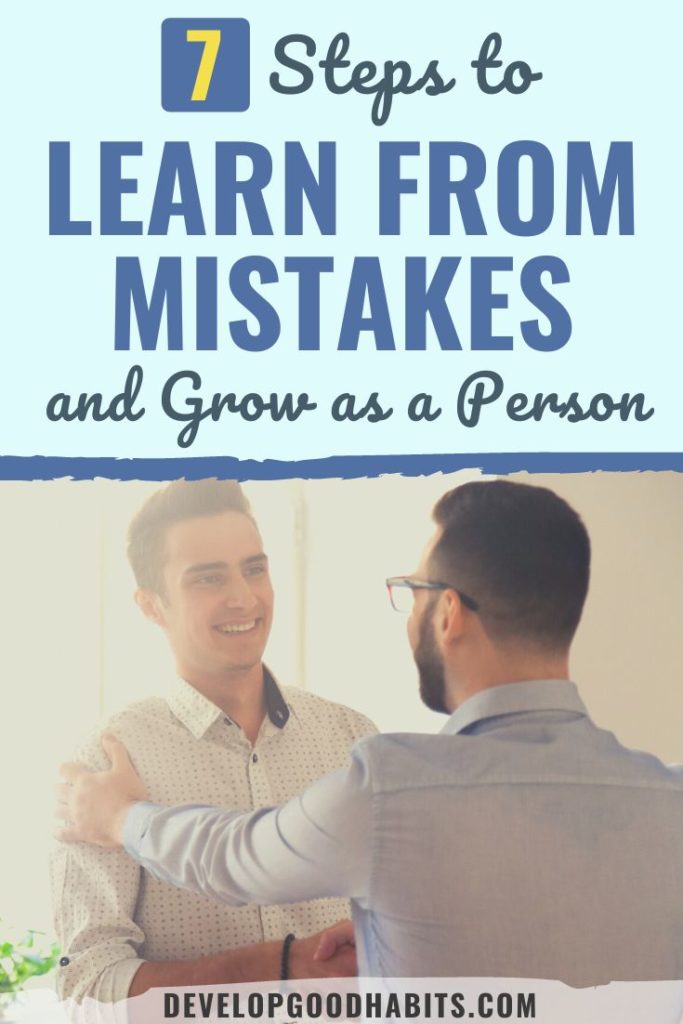We all make mistakes. If you’re going to follow your passion, try something new, or to make new friends, you’re going to find yourself doing something you wish you hadn’t.
Everyone knows that if you’re going to learn how to skateboard, you’ll fall off more than a few times before becoming a pro.
We can’t avoid making mistakes, but we can learn from them. While painful at the time, understanding how they occurred and what you will do next turns an uncomfortable truth into a positive life lesson.
That’s why we’ve put together a seven-step plan to help you pick yourself up and become the best version of yourself, not in spite of your mistakes but because of them…
Why Should You Learn From Your Mistakes?
If you’re like me, when you think about success, you envision reaching your final goal – crossing the finish line, getting the promotion, signing the closing papers for your new house… However, the process leading up to these moments is easily overlooked.
Change usually occurs after a mistake. A transformative process takes place as you move toward your goal, and it has to involve at least some errors.
The hardest part is learning to take responsibility and embrace chaos, which is an important part of progress. If you can accept this, you will be better equipped to learn from your mistakes and move towards success.
Life experience is the best teacher for making decisions. Experience can come from mistakes, miscommunication, confusion, oversight, and anything else that leads you to adjust to your life.
Mistakes often serve as motivation to learn, too. After making a mistake, you are more likely to be open to feedback. This can serve as a rude awakening that your method is not the only way of doing things. Despite the pain, you will (hopefully!) become more receptive to new ideas out of necessity.
Studies have shown that we have an “error memory”, which reminds us to perform motor tasks differently in the future after making a mistake.
Your mind develops its memories through trial and error and positive reinforcement. The Herzfeld et al. study demonstrates that learning from your mistakes is an automatic process when we practice a movement. They found that making mistakes allows us to learn faster than before in similar environments.
This may be why teachers now encourage students to make mistakes and experience rejection, even from an early age. This builds resilience and gives the children a stronger motivation to succeed. They experiment more and can make discoveries in the face of their failure.
As adults, we also need to be able to take risks and be willing to make mistakes as we work towards success. Taking responsibility for your mistakes is an imperative part of learning from them. The learning process begins as soon as you can accept them and hold yourself accountable.
Sometimes, you may need to go through a problematic situation several times before recognizing the problem and understanding how to deal with it. And that’s ok. Even if you make the same mistake more than once, in the end, you will have improved your ability to deal with similar situations in the future.
So, now the question is:
How do you learn from mistakes?
1. Acknowledge Your Mistakes
This is probably the hardest step.
It’s important to remember that just because you made a mistake doesn’t mean that your whole life is a mistake. It doesn’t mean that there’s no hope for you.
If you avoid acknowledging something you regret, it’s because you think it defines you right now—it doesn’t.
No one is perfect and if you’re making mistakes, it also means that you’re learning and growing, which is really brave, and in the end puts you ahead of the game.
Action Item: List all of the things you feel you’ve messed up in the past (or recently) on a sheet of paper. Next, add an affirmative phrase such as “and that’s ok”. (E.g. I forgot to attend that critical meeting… because I’m human.)
Allowing yourself to acknowledge and reframe your life's imperfections with the second phrase can be cathartic and interrupt old thinking patterns that no longer serve you.
2. Have Compassion for Yourself
Don’t beat yourself up over making a mistake. Instead, show yourself some compassion.
Studies have found that compassionate acceptance of your mistakes can boost your determination to reach your goals.
Indeed, lying on the couch watching television all day won’t help you finish that big project. But ruminating over it doesn’t help, either. Take the chance to let go of your poor choices, offer yourself compassion, and consider what made you waste your day in the first place:
Having compassion for yourself will help you make the best of the situation and use it to benefit you in the future.
Action Item: Try mirror work. Spend ten minutes a day looking at yourself in the mirror and saying, “I forgive myself for…” to move past any regret and hurt you’re holding on to.
3. Ask Yourself the Hard Questions
Understanding why something happened means examining how your actions led to a mistake and your contribution to the outcome.
This isn’t about blaming yourself; it’s about learning to avoid the same thing happening and noticing the signs before the ball gets rolling.
You can ask yourself:
Writing down or saying the answers to these questions aloud might be challenging. But understanding what happened in detail will help you own your mistake and avoid it happening again.
Having examined them, you might even see your mistakes as good things; they prove that you’re improving and getting closer to where you want to go.
Action Item: Write down all of your thoughts about the mistake. Write for at least half an hour to release negative emotions about the event and process it in a new light.
4. Build a Growth Mindset
Shame can be hard to overcome because when you feel shame, you don’t say to yourself, “I made a mistake;” you say, “I am a mistake.” This mindset stops you from learning and blocks solutions because we often don’t believe that things can get better at that point.
A growth mindset is developed when you believe you can improve. It’s the opposite of shame, which implies that you are a terrible person and will never change, no matter how hard you try.
Once you can accept that it’s okay that you messed up, having a growth mindset allows you to continue pursuing your goals with confidence. Having failed in some sense means that you’re closer to your goal now than you were before you made the mistake.
You’ve learned a valuable lesson that will help you get to where you need to go, and as a result, you’re always growing and getting better.
Action Item: Make a list of positive things you’ve learned from this experience that will help you move towards your goal. Add to the list things that you’re excited to learn about in the future.
5. Create an Action Plan
As you consider how you can improve in the future, make a specific plan to prevent you from repeating a mistake. Consider what led to this mistake early on. Be as detailed as possible, but stay flexible while implementing the plan.
First, you want to know how to avoid making the same mistake in the future. For example, if you always end up with the same toxic partner, understanding why this happens and how to avoid it in the future can help.
You might notice that you only call your ex when you’re feeling lonely or down, so perhaps you need to find another way of dealing with these emotions. If he/she calls you, you make sure you know exactly what you’ll say, so you don’t get persuaded back into the relationship.
If you’re concerned about repeating the same mistakes in a different relationship, you should look for any red flags you disregarded the first time.
Instead, You can plan what you would like to happen (e.g., finding a healthy relationship with someone who cares deeply for you).
Creating a plan may involve finding an accountability partner or using an app to track your habits – but no matter what, it has to be an effective way to hold yourself responsible.
Action Item: Create an ‘if-then’ plan to set yourself up for success. Think of all the ways your plan could go wrong, and work out how you would handle each in advance. That way, you will be confident your plan will work.
6. Make it Difficult to Mess Up
Let’s say you’re trying to get into the habit of running. Your alarm goes off every morning at 5:30, and every morning, you want to hit the snooze button and go back to sleep.
This is a mistake if you’re trying to become a runner. You have to stop making excuses if you want to see results.
But don’t depend solely on your willpower to prevent you from taking shortcuts or succumbing to instant gratification. Instead, increase your chances of success by making it difficult to make a mistake.
For example, set your running clothes out the night before – or, better yet – sleep in your running clothes. Have your water bottle in the fridge and ready to go in the morning, and your running shoes set out by the door.
Being prepared will help motivate you to get out of bed because you have already put in some effort to prepare for your morning run.
Action Item: Just remember that, no matter how hard it is to change a behavior or a habit, everyone makes the decision to either do it or not to do it at some point.
Essentially, you want to make the first 20 seconds of any new habit as easy as possible.
Check out the video for more tips on streamlining your new plan:
7. Teach Other People
This principle is how every Ted Talk begins. Someone messes up and then realizes the wisdom they have been gifted with and shares it with the group. Teaching others can make all of the pain you went through worthwhile – whether helping other people going through the same struggles, or helping people to avoid the problem altogether.
Learning by teaching has also been proven to be very effective. When you help other people learn from your mistakes, you reaffirm what you already know.
This step should be taken only once you’ve integrated the lessons you've learned along the way and have seen a positive change in your life because of them.
Action Item: Repeat the positive actions that have helped you improve your life and avoid future mistakes. Consider posting a vlog, writing an article, or volunteering to share your new-found knowledge and skills.
Final Thoughts on Learning from Mistakes
While you can’t change the mistakes that you have made, you can choose how you respond to them. Recognizing that mistakes are inevitable and living by trial and error is part of our natural evolution is essential.
Growth starts when you recognize and admit your mistake and try to resolve what went wrong. You will move directly toward your goal once you acknowledge your shortcomings and overcome obstacles.
Follow these seven steps to learn from mistakes and grow as a person. When you start looking at your errors as opportunities for growth, you will see them as a necessary learning experience that led you towards success.
Finally, if you want to take your goal-setting efforts to the next level, check out this FREE printable worksheet and a step-by-step process that will help you set effective SMART goals.


